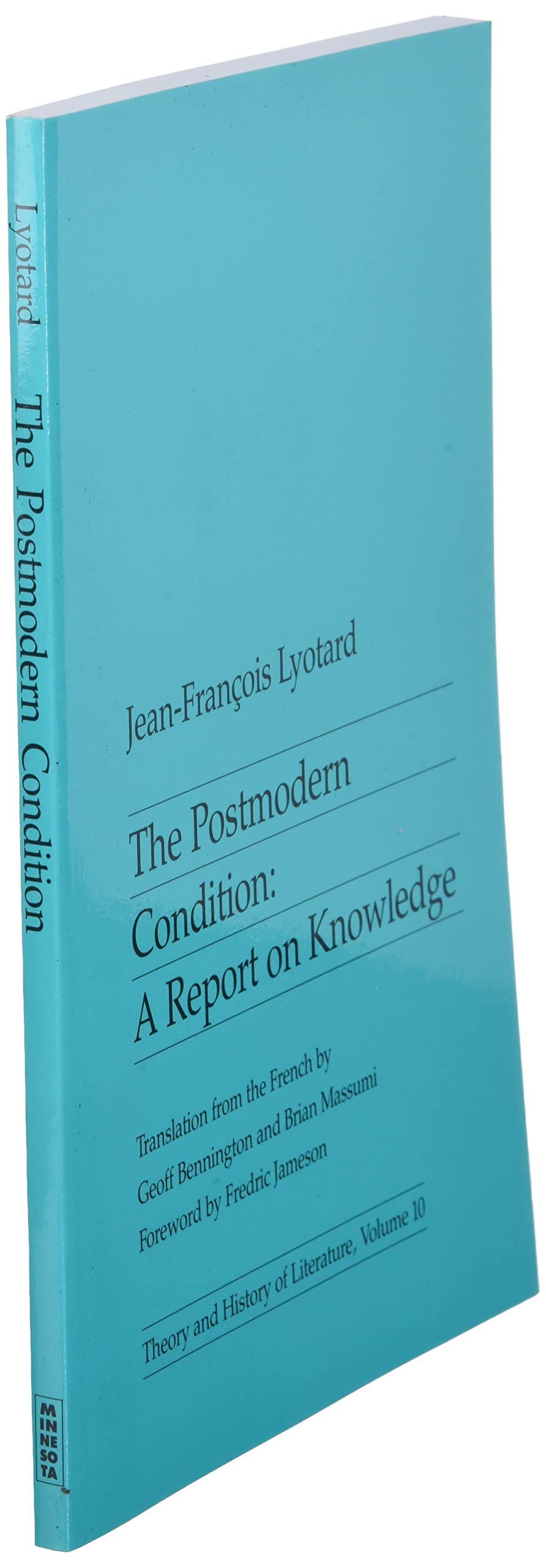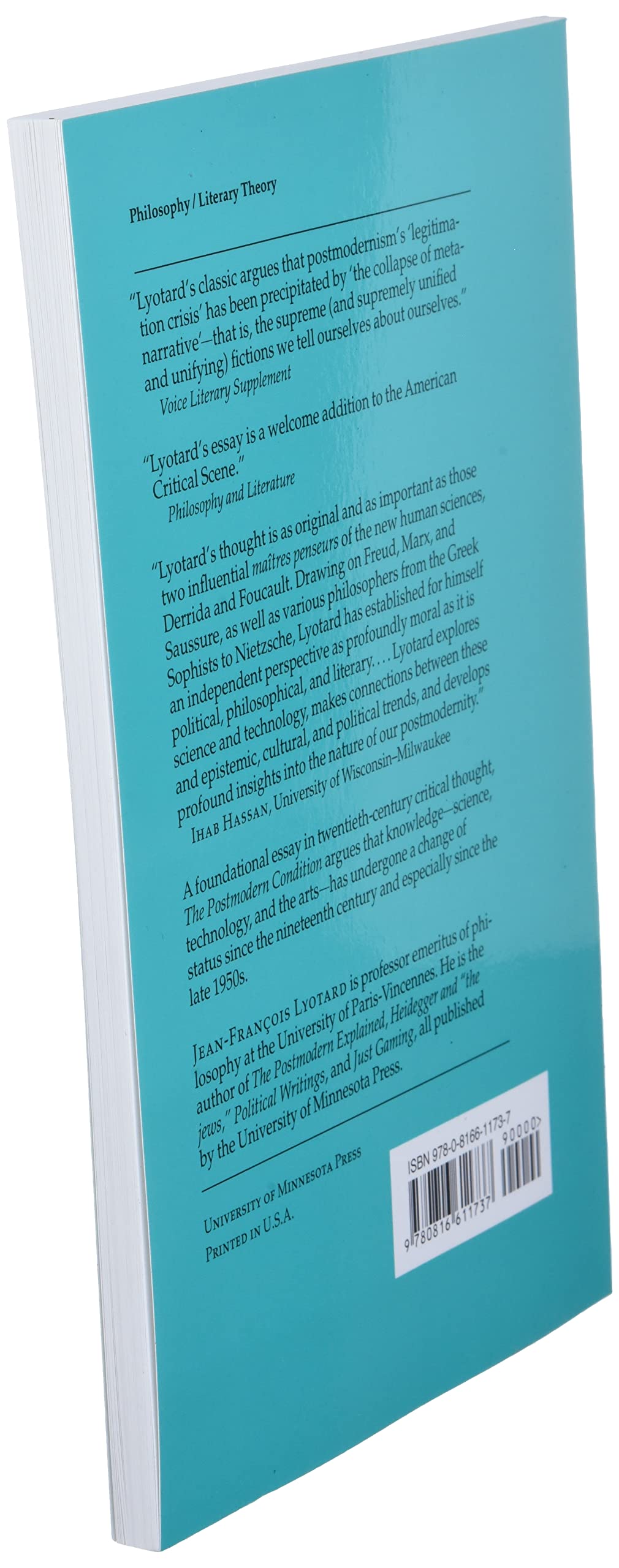





Full description not available
C**G
Dazzlingly Prescient
Lyotard begins what has come to be regarded as the signal epistemic statement of Post-Modernity (post 8/6/45) with these words: "Our working hypothesis is that the status of knowledge is altered as societies enter what is known as the postindustrial age and cultures enter what is known as the postmodern age. This transition has been under way since at least the end of the 1950s..."How has the status of our claim to knowledge altered? It has become, continuing the assertions of Adorno, Horkheimer, Luckacs and others, "commoditized". The attainment of knowledge, in our desperate moment, can no longer ever be regarded primarily as an end in itself, a process, as well as a product, but rather, as a defeasable means to an end. And whose end? We are reduced to scrambling for our own self-legitimizing narratives, and perhaps, in the final analysis, can find none. Of course, there are contextual variations on this theme. We are essentially curious. But even when the pressing questions of ontology and semantics - like what exactly are we doing here? - are answered in some vague, unsure, and predictably transient sense - these answers invariably develop a patina of inauthencity.While I believe Lyotard's philosophic standpoint owes much to his reading of the Frankfurt School - their work is prerequisite to his - he deals more precisely and in more depth with the basic Enlightenment claim that information is power, which he claims, rightfully I think, to be the source of dominant egoist ethos of our current technocratic/totalitarian social forms driving our corporate masters' obsessive struggle for scientific information, esp military-related scientfic information. The obsession with mass-produced violence has become its own legitimization, as we are forced or alternately lulled into submission by ponderance of our technology and its seemingly inexhaustible capacity for simulation. The hegenomy of modern science has left us longing for so much that we really need, peace, personal safety, a clean, sustainable, and basically quiet habitat, universal rights for all sentient beings - to name a few - that not many of us are buying that so-called objectified claims to knowledge, legitimized by "reason", are really going to answer any of our problems, which are legion. Lyotard is right about our "incredulity".I could not enter this review without citing what for me is among Lyotard's most remarkable passsages in which he discusses, among numerous other pressing issues of the current moment, "net-neutrality" and online security, close to a decade previous to the emergence of the internet, and over a quarter century before the issue reached the mainstream. Please note that this work was published in early 1979:"Already in the last few decades, economic powers have reached the point of imperilling the stability of the state through new forms of the circulation of capital that go by the generic name of multi-national corporations. These new forms of circulation imply that investment decisions have, at least in part, passed beyond the control of the nation-states." The question threatens to become even more thorny with the development of computer technology and telematics. Suppose, for example, that a firm such as IBM is authorised to occupy a belt in the earth's orbital field and launch communications satellites or satellites housing data banks. Who will have access to them? Who will determine which channels or data are forbidden? The State? Or will the State simply be one user among others? New legal issues will be raised, and with them the question: "who will know?"Transformation in the nature of knowledge, then, could well have repercussions on the existing public powers, forcing them to reconsider their relations (both de jure and de facto) with the large corporations and, more generally, with civil society. The reopening of the world market, a return to vigorous economic competition, the breakdown of the hegemony of American capitalism, the decline of the socialist alternative, a probable opening of the Chinese market these and many other factors are already, at the end of the 1970s, preparing States for a serious reappraisal of the role they have been accustomed to playing since the 1930s: that of, guiding, or even directing investments. In this light, the new technologies can only increase the urgency of such a re-examination, since they make the information used in decision making (and therefore the means of control) even more mobile and subject to piracy.It is not hard to visualise learning circulating along the same lines as money, instead of for its "educational" value or political (administrative, diplomatic, military) importance; the pertinent distinction would no longer be between knowledge and ignorance, but rather, as is the case with money, between "payment knowledge" and "investment knowledge" - in other words, between units of knowledge exchanged in a daily maintenance framework (the reconstitution of the work force, "survival") versus funds of knowledge dedicated to optimising the performance of a project."The promise of freedom and stability through corporatized ownership of the world's resources and markets (globalization) is a metanarrative we can simply no longer afford - and the putative effectiveness of corporate modelling as a structural principle for social organization is a uptopian myth which must be publically debunked, asap - for our survival requires a new level of caring - a new ethical concientiousness. We cannot afford acts of ecological carelessness or unconscious, blatent disregard, in the name of outworn ideology. We cannot continue to curtail access to knowledge through some sort of cultural spin, weighted to the random prefrence of the status quo. The current push toward media consolidation is yet another symptom of the same terminal trend to smaller and smaller group decision-making. If knowledge is power, which is what enlightment and its socio-ecomonic cultural expression, capitalism, avers, then power must, at the least, remain accessible to all sentient beings, at least within the purview of their aspirations.
A**R
Still relevant today
Lyotard’s reflection on the post modern condition reads as a prophecy. His analysis concerns knowledge and how the situation of knowledge as commodity has overcome the enlightenment conception of knowledge for the sake of knowledge. The impact of the postmodern conception of knowledge cannot be denied, and while it may seem hopelessly nihilistic, Lyotard points towards actions that can still lead to justice. Very readable, this classic of post modern analysis is as poignant today as it was over 40 years ago.
A**D
The philosopher Lyotard is masterful at explaining his views of ...
The philosopher Lyotard is masterful at explaining his views of postmodernism. Although there are others who see today's world differently Lyotard's rendition helps bring cohesion to how the world has changed and how it is likely to continue to morph. This book is a must for philosophy and worldview students who want to understand postmodernism at its most profound levels.
A**Z
Arresting
This brief report on the condition of the legitimation of knowledge was a ground breaking text at the time it was written; the predictions made by Lyotard about the role technology would play in the pursuit for power became a reality that freezes anyone (consider some recent events: WikiLeaks and the most recent virus secuestering users' personal information). Lyotard's book enters the arena of modernity in order to propose a new condition in the legitimation of knowledge. At times confusing, this could be sorted out if one tries to highlight synonyms for the key concepts. Jameson's preface is an excellent help while doing this. The Postmodern Condition: a Report on knowledge is a perfect match to dialogue with Georg Lukács and other critics interested in Modernity.
E**E
La reinterpretacion de la la cultura...
PARA EL CURSO QUE DICTO EN EL POSGRADO...
A**R
a very fine book
a very fine book, creative, nuclear, interesting and very singular in the most fundational line of la France philosophique. Cute. Important.
H**N
Thanks!
Thanks!
Trustpilot
2 weeks ago
2 months ago